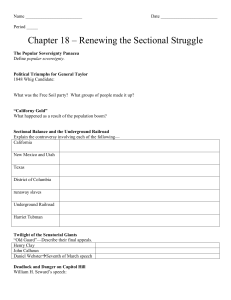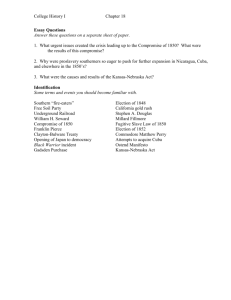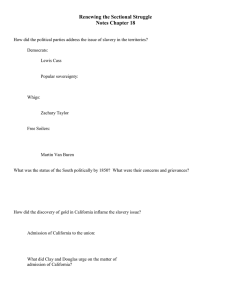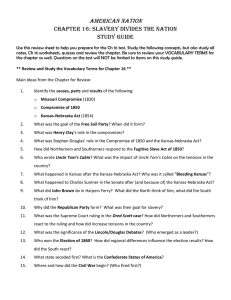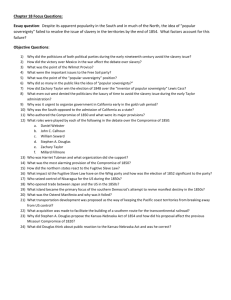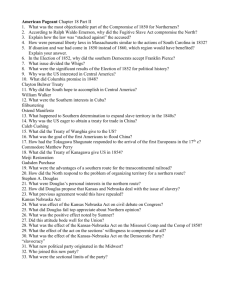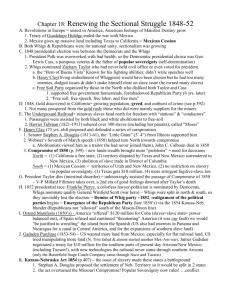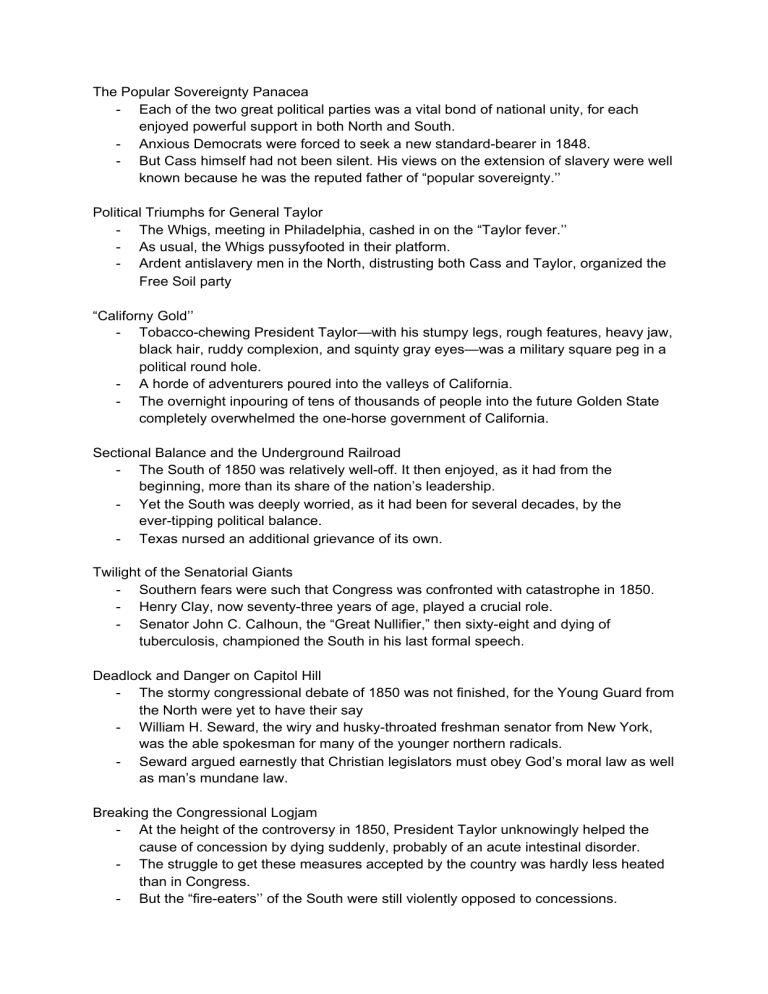
The Popular Sovereignty Panacea - Each of the two great political parties was a vital bond of national unity, for each enjoyed powerful support in both North and South. - Anxious Democrats were forced to seek a new standard-bearer in 1848. - But Cass himself had not been silent. His views on the extension of slavery were well known because he was the reputed father of “popular sovereignty.’’ Political Triumphs for General Taylor - The Whigs, meeting in Philadelphia, cashed in on the “Taylor fever.’’ - As usual, the Whigs pussyfooted in their platform. - Ardent antislavery men in the North, distrusting both Cass and Taylor, organized the Free Soil party “Californy Gold’’ - Tobacco-chewing President Taylor—with his stumpy legs, rough features, heavy jaw, black hair, ruddy complexion, and squinty gray eyes—was a military square peg in a political round hole. - A horde of adventurers poured into the valleys of California. - The overnight inpouring of tens of thousands of people into the future Golden State completely overwhelmed the one-horse government of California. Sectional Balance and the Underground Railroad - The South of 1850 was relatively well-off. It then enjoyed, as it had from the beginning, more than its share of the nation’s leadership. - Yet the South was deeply worried, as it had been for several decades, by the ever-tipping political balance. - Texas nursed an additional grievance of its own. Twilight of the Senatorial Giants - Southern fears were such that Congress was confronted with catastrophe in 1850. - Henry Clay, now seventy-three years of age, played a crucial role. - Senator John C. Calhoun, the “Great Nullifier,” then sixty-eight and dying of tuberculosis, championed the South in his last formal speech. Deadlock and Danger on Capitol Hill - The stormy congressional debate of 1850 was not finished, for the Young Guard from the North were yet to have their say - William H. Seward, the wiry and husky-throated freshman senator from New York, was the able spokesman for many of the younger northern radicals. - Seward argued earnestly that Christian legislators must obey God’s moral law as well as man’s mundane law. Breaking the Congressional Logjam - At the height of the controversy in 1850, President Taylor unknowingly helped the cause of concession by dying suddenly, probably of an acute intestinal disorder. - The struggle to get these measures accepted by the country was hardly less heated than in Congress. - But the “fire-eaters’’ of the South were still violently opposed to concessions. Balancing the Compromise Scales - Even the apparent gains of the South rang hollow. - Most alarming of all, the drastic new Fugitive Slave Law of 1850—“the Bloodhound Bill’’—stirred up a storm of opposition in the North. - So savage was this “Man-Stealing Law’’ that it touched off an explosive chain reaction in the North. Defeat and Doom for the Whigs - Meeting in Baltimore, the Democratic nominating convention of 1852 startled the nation. - Pierce was a weak and indecisive figure. Youngish, handsome, militarily erect, smiling, and convivial, he had served without real distinction in the Mexican War. - General Scott, victorious on the battlefield, met defeat at the ballot box. President Pierce the Expansionist - At the outset the Pierce administration displayed vigor. - The intoxicating victories of the Mexican War stimulated the spirit of Manifest Destiny - These visions especially fired the ambitions of the “slavocrats.’’ Coveted Cuba: Pearl of the Antilles - Sugar-rich Cuba, lying off the nation’s southern doorstep, was the prime objective of Manifest Destiny in the 1850s. - Cuba was a kind of heirloom—the most important remnant of Spain’s once-mighty New World empire. - Private adventurers from the South now undertook to shake the tree of Manifest Destiny Pacific Railroad Promoters and the Gadsden Purchase - Acute transportation problems were another legacy of the Mexican War - Feasible land transportation was imperative— or the newly won possessions on the Pacific Coast might breakaway - Railroad promoters, both North and South, had projected many drawing-board routes to the Pacific Coast. Douglas’s Kansas-Nebraska Scheme - At this point in 1854, Senator Stephen A. Douglas of Illinois delivered a counterstroke to offset the Gadsden thrust for southern expansion westward. - A veritable “steam engine in breeches,’’ Douglas threw himself behind a legislative scheme that would enlist the support of a reluctant South. - Douglas’s Kansas-Nebraska scheme ran headlong into a formidable political obstacle. Congress Legislates a Civil War - The Kansas-Nebraska Act—a curtain-raiser to a terrible drama—was one of the most momentous measures ever to pass Congress. - Antislavery northerners were angered by what they condemned as an act of bad faith by the “Nebrascals’’ and their “Nebrascality.’’ - Henceforth the Fugitive Slave Law of 1850, previously enforced in the North only halfheartedly, was a dead letter.
